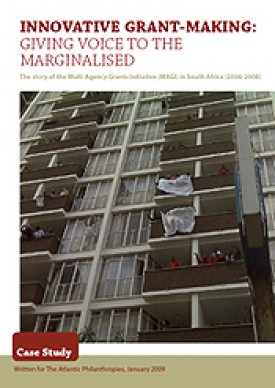Innovative Grantmaking Gives Voice to the Marginalised
Resource type: Case Study
Multi Agency Grants Initiative |
This case study describes how a group of large donors found an effective means to collaborate to make grants to small, grassroots organisations in South Africa through the Multi Agency Grant Initiative.
The story of the Multi Agency Grants Initiative (MAGI) in South Africa (2006-2008)
In reality, this is the beginning of an ongoing story. MAGI is a relatively new venture but there has been time enough to see its potential and share its learnings. In an increasingly polarised world, where the gap between the haves and have-nots is fast becoming a chasm, there is no time to be lost in providing support to the marginalised so that their voices can be heard in mainstream debates about development and human rights and their lives can take centre stage in understanding the challenges faced. This case study is based on a formative evaluation of MAGI, by Nell and Shapiro cc for MAGI in August 2008.
This case study describes how a group of grant-makers came together to meet the need they saw in South African society for a small-grant making mechanism, aimed specifically at community-based organisations (CBOS) working in the human rights and development fields. They formed a consortium of donors called the Multi Agency Grant Initiative (MAGI) to meet the needs of community-based service organisations and emerging membership-based social movements on the fringes or margins of the more mainstream development sector.
The consortium members believed that, if this grouping of organisations was to be strengthened in terms of infrastructure and understanding of the bigger picture of development and the origins of the need for development, their voice in the debates that concerned them should be augmented.
This original consortium, all the members of which were experienced grant-makers, agreed that the need to infuse funds into this emerging sector, in a targeted and strategic way, was not being sufficiently met. Their experience told them that collaborative models among donors could work.
Many of them already gave large grants in South Africa but were frustrated by the restrictions on being able to make a difference at the grassroots level by giving small grants. A key part of the concept was matching funds, which would mean that considerably more could be leveraged from the original consortium members and any others who joined.
Both The Atlantic Philanthropies and the Humanist Institute for Co-operation with Developing Countries (HIVOS) – as per its arrangement with the Dutch government – were able to contribute more on this matching principle. There are now six consortium members: HIVOS, The Atlantic Philanthropies, Breadline Africa (BLA), Women’s Hope Education and Training Trust (WHEAT), Uthando (an associate member providing the dimension of South African business) and the Ford Foundation.
They are actively involved in the grant-making process, bringing a mixture of experience, enthusiasm and commitment to the table.
Although not discussed much, the underlying understanding of the need for the voice of marginalised people to be heard in advocacy debates was something that informed the thinking of all the original members.
The consortium members brought with them a range of sectors in which they were already active in their donor agency roles, and they saw the advantages of strengthening the sectors in which they already worked as well as making contacts in others. For the large-scale donors, more used to giving in excess of a million rand, this was an opportunity to provide small grants (up to R75000), an opportunity which the proportionately large administrative load usually associated with smaller grants prohibited. MAGI developed and administered a system that lightened this load without compromising on issues of accountability.
Within the MAGI model there was also room for targeted capacity-development directly, through the MAGI project officers, and through using strategic partners to mentor emerging organisations. Funds are allocated for this. Strategic partners is usually the term applied to networks and established organisations active in a particular sector, or in civil society generally, some of which provide key information and contacts and others of which are also used to do capacity-development with grantees and would-be grantees.
